Yesterday I had quite a treat. I got up a bit too early for me, and waited for Cassandra and Sonia at the Iglesia (church) at 7.30 in the morning. We hopped in a taxi, and made our way to the bus station,
to wait for Gusto to arrive, a man that works at IEPLAM, the place where we were going to go visit. Several men crowded around us, haggling, trying to get us to take the taxi to Pisac, instead of the bus, but
the bus we ended up taking. It is so funny, all the buses here have this picture of Jesus being beaten, usually surrounded by some gold trim, hanging from their windows. This bus had several, and I think they
were made with old CDs, too. There was also a big crack in the window (as their are in many of the buses), and a big sticker of Jesus was placed over the center of it. Down this windy roads, with the steep
cliff drops, I guess they really do depend on Jesus to get to their destinations!
We made our way to Pisac, a little town in the Sacred Valley, on the Urubamba river. We walked down a dirt road for about 20 minutes, until we came to this beautiful little farm, which grows medicinal plants.
Gusto showed us all the different plants they grow there, and pulled off leaves and flowers for us to smell, and explained their uses. they even had the three plants that the Incans used to mummify their dead, which are now used in facial creams to fight off wrinkles. Well, if it preserves the skin of the dead, I'm sure it preserves the skin of the living!
This organization, IEPLAM (www.geocities.com/ieplam only in spanish for now, but it has pictures), is great. Not only does it grow the tradition Incan plants organically, and export the products to Germany and the US for natural health, it also provides the local campesinos (poor country folk) with medicines that they can use, instead of having to rely on expensive western medicines. But, the main thing is so much more than that, because the main focus is not just to make money. They get the local communities involved, and set them up to grow these plants, which IEPLAM then orchestrates the international sale. The local people also sell their products at the markets. 60% of the money that comes back goes directly to the people. Which is really really great, because these people normally only make $30 a YEAR. They are too poor to send their kids to school (because here in Peru, school costs money), and live a pretty bare existence.
This has really caused quite a bit of positive change, as well. Normally, the campesiños (which are more indians than mestizos), have a VERY machismo society, more so than regular Peru, which is quite a feat.
Apparently, the women are seen as pretty lowly, and are beaten frequently. When this program is instituted in the communities, at first, it is only women who grow the crops, because the men believe it is "women's work". but then what happens? With time, it is the women that are bringing in all the money, and the attitude in the family changes. The woman's self-esteem raises, as she is the one who provides for her family, and also, they are very proud that their work is being exported to places like Germany and the US. Then the men start to think, well, maybe this work isn't so bad, and they begin to get involved as well.
So, when we go to our supermarket, and buy our little organic made in Peru moisturizer, we have no idea at the effect that we are creating in this world. To think, that your $5 means that you are helping to create a culture where women are seen as equals, and encourages pride in their heritage. I think that is pretty magnificent.
I also learned some other interesting things about the culture. For instance, the native religion, from the times of the Incans, is still alive and well. In this religion, there are three worlds, the upper world
which is related to the condor, the earthly level, which is related to the Puma, and the lower level, which is under the earth, which is related to the serpent. Well, in these communities, there is a lot of sickness, especially with the children. When some people came in to help, they told them they needed a sewage system, and set one up, with the pipes going in the ground. When they came back 6 months later, the children were still sick, because nobody was using the sewage system. Why? Because they couldn't put their human waste in the lower world, it was totally against their beliefs. Another way that shows you it is important to understand the culture that you are trying to help.
Did you know, that here in Peru, they don't need to use western contraception, because they have a local plant that the women take to make sure that they don't get pregnant? Apparently, it is pretty effective too, as long as you harvest it at the right time!
Well, I really enjoyed this day, and am very happy about the work that IEPLAM is doing. I even offered to help do their website in English! So, that will be a little project for me this summer, and a great way to continue to work on my Spanish.
Okidoki, adios!
Jillian
So, Jillian attended her first Mass!
My "sister" Sonia kindly set up a meeting for me with a Catholic priest that does/teaches Liberation Theology. I made up my little list of questions, and had her translate them in Spanish, just to be sure. I
was quite nervous, because I knew this was going to be all in Spanish, and I hoped I could understand!
I waited for Sonia on the steps of the Temple of the Sun (Coricancha), which was rebuilt into a Dominican cathedral, at 7pm. We made our way inside the church, and to my surprise, the mass was being said. We took a bench, and I carefully watched everyone around me,
to sit, stand, and kneel at the correct times. It was all in Spanish, and quite different than a protestant service. There weren't that many people, but then, it was a Thursday night. Looking up at the Jesus hanging on the wall, he almost seemed more alive, more real. A local Cusqueñean band played along with the service, and at one point, sang a song with the chorus "Mi amigo Jesus", which for some reason struck me as funny. Wish you had been there, Celeste! And then the time
came for the communion, and I don't even know if I'm allowed to take it, since I haven't been baptised. Oh well, I was quite nervous, as I got in line behind Sonia, and hoped that I wouldn't do something to
utterly embarrass myself. When I got to the priest, I
just stuck my tongue out, received the huge wafer which tasted vaguely familiar, and returned to my seat, wondering if it was blaphemous to chew the body of Christ. Hm.
After the service, we made our way to the priest, who was a very gentle man. We followed him out the door of the church, down a narrow avenue/alley where floods of students passed us by. We made our way to his home (?), to a sitting room, where he talked at quite some
length about liberation theology, which clarified things for me.
This priest certainly was liberal! He believed that the Catholic church needs to change, to let women be priests, to allow contraception, and one other thing, which at the moment escapes me. He actually was from Spain, and realized that these changes, especially with women, were probably unlikely. But the basic kernel that I gleamed about this discussion, was that Liberation Theology is about trying to restructure the church in Latin America, so that the focus is on helping the poor, using the bible to support the ideas.
I felt quite grateful that my Spanish was good enough to be able to understand him (even though he did have a weird accent from Spain "ethetera" instead of "ecetera"). If I had come here with no Spanish, I
would have missed out on so much!
-Jillian
It is amazing, everyday, as I bus into school, to see the life bustling about on the streets of Cusco.
Today was garbage day, and that was quite interesting. They leave their bags of garbage on the sidewalks, along with misc refuse. I even saw a dead guinea pig, which was quite unpleasant. The dogs that roam around the streets sniff out the garbage, and are quite adept
at chewing threw the plastic to find the goodies inside. After the dogs come the women, from poorer areas of town. They dig through the garbage, looking for food and other things (including empty plastic
bottles), to take away in their bags. It is amazing, the level of poverty, and so sad.
I continued on my way to the bus stop, and hurried aboard, stumbling my way to my seat, hoping not to put my manchila (backpack) in anyone's face. This has happened before, and I've gotten a few dirty looks. I stare at the window, as the bus makes its way down the
streets of the barrio (neighborhood). There is a man I frequently see near the open market, who is in a wheelchair, and quietly holds a dish, in hope for spare change. I cannot imagine how difficult it would be to be handicap here. First off, just navigating through the streets and erroding sidewalks must be a daily challenge. And in a place where unemployment is between 40-60%, being handicapped must making living impossible. I don't see many handicapped people here, only him, and another guy on crutches who was missing a leg. Do they stay inside? Or just chose not to live such a challenging life?
I also see several men that sell their fruit, it is quite interesting. They have a rig that is a cart powered by a bicycle, with a canvas roof, and they peddle through the streets, using a megaphone to shout out their wares.
The other night, on my way to my salsa dance class at school, there was even a man herding a donkey down the narrow avenue (pedestrians only) that my school is on, and this is downtown! I quickly stepped to the side, as the donkey left several lovely mushy treats behind.
And, there are the women that set up their barbeques, and roast skewers that you can buy. I do question what kind of meat it is. And several vendors selling cigarettes, and candy, and gaseosas (sodas).
What a different world!
Jillian
So, yet another day passes in Peru. I went to the cafe where I'm now a regular, the waitress remembered my name, and asked me where I had been since my last visit. I felt like a traitor for having spent two
days in another cafe! It is quite interesting, being alone in the resteraunts, they always ask my name, and where I'm from, and how long I'm staying. It is quite surprising, you would think they would be tired of all the tourists! But I suppose a young single woman who
speaks in Spanish is a rarity.
I've learned more interesting tidbits about Cusco. This morning my family talked with me about the tunnels that are underneath Cusco. I had read a little bit about them, but didn't realize they were so
complex, and went all the way to Macchu Pichu! They were created by the Incans, and were used to hide the gold when the Spanish were attacking. Apparently, they are quite dangerous, people go in there, and never return. There are many tunnels, and it is easy for one to lose one's way. And also there are lots of poisonous spiders and gasses (apparently from the gold), so that adventurers could die before they found their way out.
I can just imagine, someday in the future, when Cusco is wealthy again (which I believe will happen), that they will reopen these tunnels, making them safe for tours. How amazing would that be!
Also, my professor, Gary, told me that in Manu, the rainforest close to Cusco (on the other side of the Andes), there is a bit of slavery. People (specifically Peruvians), get lured over there to work for money, but then it turns out that nope, you just get to work for free. Apparently, there isn't any police over there, so who can stop things?
Those are my thoughts for now!
Jillian
So, this year I passed my birthday in Peru, and had quite a good time after all!
On Saturday, the day I celebrated my birthday, several students and professors played a game of futbol (soccer). Did I play? Of course not! I sat with another girl from Germany, as we cheered on the boys,
who seemed to tire quite quickly, and got extremely wet since we had had quite a rainstorm earlier in the day. The boy who was about 10 years old made the most goals of anybody!
Afterwards, several of us went downtown, to the Plaza de Armas, to meet up with other people, to go out for my birthday. Jessica (girl from Germany), Eric (one of my professors), Saul (another professor at the
school), John (a student from London), and some of Saul´s friends ended up in a club called Garabato. The walls and chairs were decorated in animal furs, and was quite full of local Peruvians. We danced, and we drank, we talked. The Peruvians were quite impressed with how well I could dance, but of course, I´m from the US! I got a bit dizzy, though, because they kept passing me around person to person to dance with, because it was my birthday. Apparently the custom is lots of dancing, lots of hugs, and you get three wishes, how about that!
I also learned another phrase that I must remember not to say! At one point, it got really quite hot in the club, and I had to go outside to get some air. In the hallway, a guy said to me "¿Como estas?", and I replied "Bien, pero yo estoy caliente" Meaning to say, fine, but I´m hot. As soon as I said it, I realized I´d used the wrong form, and replaced it with "calor! calor!" But he was already laughing and looking at me
strangely. When I returned to my friends, I asked Eric what exactly I had said, and apparently "yo estoy caliente" means "I am horny". Great. Okay, another phrase to remember not to use!
But the club was a lot of fun. Towards the end of the evening, there was a Peruvian band, that sang Peruvian songs, and everybody in the club (except for the few gringos like me) sang along. And they also had
traditional dancing, a man and a woman, in old fashioned clothes, with big hats, and the woman in a big skirt, who danced beautifully. It was so romantic, they kept coming together to pose like they were about to kiss, and then would dance off again.
At the end of the night (when I thought I was going to die from the heat), we took off. Eric, who lives near me, took a taxi home with me, and walked me to the door, which was quite gentelmanly. I got home at
about 2.30 and crashed.
I must have eaten something bad, because in the middle of the night, I had chills, and was a bit sick. I slept until three in the afternoon, and then felt much better. I think that it was because that I am taking
Acidopholus regularly, that it didn´t hit me any worse than it did.
At 3, I got up and showered, and came downstairs for my birthday with my family. They bought me a delicious coffee cake, and sang happy birthday to me in Spanish and English, how about that. And I had my
3 more wishes! Afterwards, I went with Sonja to her husband´s family´s house, where I had more cake, and got to meet more people, and struggle through my spanish, since I was too tired/didn´t feel well.
The next day, I was off at 9 in the morning to meet up with Cassandra, the girl from Canada, who couldn´t make it for my birthday because she had volunteer work that day, and it was 3 hours away by car, so she missed it. We met up with the barman, Fritz, that we had met at Rosey O´Grady´s Irish pub earlier that week. We took at taxi to Moray, which is an Incan site for agriculture. It was great, because there
were only 4 other people there, and it was so quite and beautiful. It is set up as concentric circles that go higher and higher (am I explaining this right?) And on each level, they would grow their crops, different crops on different levels, because of different temperatures. They still grow crops in the lower circles. And, in the very middle, there is a
small circle where the put some offerings (flowers, products from the plants, etc) for the crops.
It was beautiful, but all that climbing wore me out. And I could tell that the romance between Fritz and Cassandra was growing, so I lagged behind a bit,to give them time alone (wink wink).
Afterwards, we went to the town Urubamba, where Fritz bought us lunch. The plates were huge! I had fried chicken, and they ate fish, and we talked more in Spanish. As customary, we had shots of this anise flavored liquor, which is supposed to help with the
digestion/break up the fat. The restaurant was quite serene, looking out at the hills of the Sacred Valley, listening to the wind, fighting off the flies, visiting with the dogs. It was lovely.
We then strolled for a while through the streets of Urubamba, Cassandra and Fritz walking arm and arm. I was glad I had put on sunblock, because the sun is quite strong, and I`m a little red in the areas that I didn´t get my sunblock on.
Eventually, we made it to the bus, and I made sure to allow Fritz and Cassandra to sit together, I stared out the window watching the scenery while they made kissey face.
We got off the bus in Cusco, avoiding the boy who was pissing quite near us, and made our way to a taxi, where I went home and crashed.
Happy birthday to me!!
Jillian
So, Thursday I ate Cuy. Quite interesting. For those of you who don't know, Cuy is guinea pig, and it is the favorite dish here in Cusco.
The whole school, professors, spouses, and students, piled in several taxis, and made our way up the hillside, up dirt roads, to the edge of town, and entered this really rustic adobe building, which was completely empty. After climbing a few stairs, we realized we WERE in the restaraunt. The family greeted us as we passed by, and we found our way to a very long table that looked over the most amazing view
of Cuzco. We all sat down, chatted in Spanish (although a few students aren't as proficient, so we had to chat a bit in English). Eventually two big things of coke were brought out, and two big things of beer, and glasses were filled all around.
Eventually, huge dishes were brought out to everyone- the cuy, with fried stuff peppers, potatoes (which come from Peru originally, did you know that?), and some other mixture of stuffed potatoe skins.
Now, cuy is not guinea pig cut up into unrecognizable pieces, oh no. They bascially take the guinea pig, remove all the fur, cut off the head (sometimes), cut it in half, and remove some of the guts (but not the
heart), put seasonings inside, and bake or fry it. Apparently, baked is preferred. And then they serve it to you, and you pick it up with your hands, and dig in.
No, it didn't taste like chicken. The closest thing Icould guess would be turkey, but that isn't quite it either. It was a bit difficult, because, hell, this is a pet! But, I tried to put those thoughts aside, and enjoy the one and only time I will ever eat cuy. It actually tasted pretty good. But you do have to dig for the meat. And they do leave the feet on. Um.
My professor was very impressed at how much my spanishimproved after a few glasses of beer, and the next day suggested we serve beer in the classes, to make everyone speak better spanish. ;)
Afterwards, we all piled into a bus-van, and made our way back to the school. I returned home for a bit of a rest, and then returned to the school for salsa lessons! Luckily we had a good balance of boys and
girls, and my partner was a pretty good dancer, so I was luckily. He actually is going to move to Portland this year to work at OHSU as a cardiologist!
At one point, a woman came in and sat down, a friend of one of the students. And she started smoking. I have a hard enough time breathing when people are smoking, with the altitude, it is awful, i get dizzy and really can't breathe. Then add the amount of exercise I was getting with the dancing, and the amount of air needed, and I thought I was going to pass out. My partner asked her to put out the cigarette, but I had to leave for a bit anyway to breathe fresh air. She came out later, and sat by me to chat. Turns out she's from Eugene, Oregon! How crazy, three people who live/will live/have lived in Oregon, in a room of about 10 people in Peru. I guess the world really is a small place, huh?
You know, it is also interesting, nobody smokes around here, which I think is suprising. The only time I see people smoke, they are tourists. I asked about it, and apparently quite a few Peruvians smoke, but they only have one cigarette a day. Huh, interesting.
Anyway, I had a great day, and returned home for a nice rest. Tonight I get to put those dance skills to the test, as I'll be going out to celebrate my birthday! But first, I guess to a football (soccer) game!
¡Adíos!
Jillian
Here is a day in the life of Jillian in Peru...
First, I wake up at about 7.15 in the morning. I go and switch on the little switch by the shower to make sure I get hot water, and have to remember to turn the knob the opposite direction than normal to get hot water (this was quite an experience the first time, the water kept getting colder and colder the more I turned it to the left).
Once I'm all dressed (usually in jeans, because nobody wears skirts here, but I was told by one of the guys at my school that it is because the women don't have as nice of legs as I do- they do tend to be a bit
thick here), I go downstairs, where I say "Buenos Dias, Como estas" to whoever is around (usually Sonia) and give them the customary kiss on the cheek, as I sit down to eat my breakfast. This usually consists
of a type of bread specific to Cuzco, which is kind of like a roll, with jam, coffee, and whatever else they decide to serve me. Sometimes it is eggs, sometimes french fries, once chicken, and today it was jello and cake, which was quite interesting.
After visiting with them in Spanish for quite a while, I take off for the bus. I walk about a block, down sidewalks that are heavily eroded (acid rain from the pollution ??) and smile at passerbyers who stare at me (what is a gringa doing here?). I pass by many dogs that run wild through the streets, eating trash, and look like they have had about 20 litters, and wait for the bus "El Dorado", which is the size of a large van. I cram myself on the bus, and if I'm lucky, I get a seat. If not, I stand, and once again receive looks, because I'm always the only gringa on the bus. Eventually the guy who hangs out the door and shouts the direction of the bus at the stops like an auctioner, comes around to collect my 50 centivos (about 15 cents). Eventually, we come to my stop, and I shout "abaja", and climb down to the street below, where I don't get as much odd looks, because now I'm in tourista territory, and I'm not so odd.
I make my way up the little alleyway, that has a gutter running down the middle of it, and sometimes smells like urine, to the little archway that leads to the courtyard of my school. I listen to the two parrots that live in the courtyard, as I climb the big thick steps that are from colonial times. I have to catch my breath a little at the top, and then make my way down to the door that says Macchu Pichu Spanish
School. There I greet my fellow students (there are about 8 of us), and evenually find my way into a little classroom with my "professor" and the other girl from Germany who is at the same level I am. For the next two hours, we practice the eight million ways to conjugate spanish verbs, while listening to the professor's machismo jokes, and do other exercises, like describe our perfect man, or who are favorite
male actors are, or tell the professor how he should treat a woman. Do you see a theme?
Then we have a fifteen minute break, where I try to get on the internet a bit, or sometimes visit with others, before we are shuffled into the class for the next two hours with a different professor. Basically
the same stuff, but no machismo jokes, instead we usually talk about the differences of cultures, which of course I love.
Afterward I make my way to the plaza and pass by all the people that want to shine my shoes, sell me phone cards, dolls, pieces of cloth, post cards, trips to macchu picchu, or sometimes just ask for money. Often the people are only just kids. I usually just say "no gracious" or "yo estoy bien". Then I go through another archway, climb more stairs, and find myself in a little cafe, where I say "buenos tardes" because by now it is after 1. I'm handed a menu, that has everything in english and spanish, although often the english translation is a little quirky. I usually order a cafe americano, agua con gas (mineral water), and a little something to eat, like chicken empenadas. The waiters then chat with me a bit in spanish, ask me where I'm from. I notice the other people in the cafe usually order in english, so I'm always proud that I can visit in Spanish. The other day the young
woman who was my waitress sat down and visited with me for quite a while. She talked quite fast, but luckily I didn't have any problems. I noticed the other white patrons stared at me a bit. I'm getting used to this whole staring bit.
Afterwards, sometimes I return to the school to type on the internet some more, or hang out with a friend (Cassandre). Then, around 6, before it gets to dark, I shuffle my way onto the bus, and repeat the morning experience. I find my way back to my casa, where I have to remember to turn the key to the right to open the door (I broke the lock the first time by turning it to the left and they had to call a guy to fix it). I say buenos noches to whoever is around, giving a kiss on the cheek, and turn down dinner, because I'm usually still full from lunch (my stomache has shrunk a bit). I'll often visit in spanish for a few hours, and then return to my room up three flights of stairs.
I turn on the tv, hoping to find some show in english, but am always disappointed. I do find the wonder years in spanish, as well as this odd game show that is just a big advertisement for everything from toothpaste to bank cards. Also, Clueless and a movie with Arnold Schwarzenneger dubbed in spanish. A little odd for me. I turn off the tv, and do some of my school reading for my independent classes, or my homework for the language school, and listen to the dogs bark outside. I turn on my music, and then go to bed at around 9.30, because there isn't much else to do.
So there you are.
Jillian
(Another e-mail from my time in Peru)
Some other things have come into my head about Peru, which I think are interesting, which I shall share.
Where are the Americans??? I swear, everywhere I go, Germans Germans Germans. Today, at a cafe, at both other tables were Germans. It was interesting, because they had to order in English, since they didn´t know Spanish.
Oh, and coffee. It is interesting, in Peru they take the essence of the coffee in a liquid form, and then add hot water to it. It is quite good. And Dad, you´ll be happy to know that you can get an Americano
here too, they have cafés with all our favorite coffee drink. One size fits all, though.
The thing that I have the most problem with, though, is the bathroom situation. You aren´t suppose to put your toilet paper in the toilet, but in the wastebasket next to the toilet. I just can´t bring myself to do that, especially where I live. I don´t want to smell that! It is bad enough here at the school, the smell, makes me want to gag.
Alright, that is my thoughts for now!
¡Hasta Luego!
Jillian
(After one e-mail, Liz Hallstrom, an old coworker and friend of mine, wrote me an e-mail, here is her e-mail & my response)
-- Liz Hallstrom wrote:
Who fills your classes? what nationality are they? how old? do you feel like a tourist? are your housemates warm and friendly with you? who does the cooking? do they have chicken and beef? what is the weather like? lots of ?'s. does anyone in your village want to come here? what is the population? good for you and your speaking ability. Very interesting, keep up the notes.
-- My response:
Oh Liz, everywhere I go with my white skin, yes I do feel like a tourist. Especially in the area where I live, there aren´t any other gringas, and everyone looks at me. I just smile, and keep going. I understand, it is odd to see someone so different in that area. It is hard to imagine in the US, because we have people of all different types, but I remember in Ireland, to see a black person was amazing. And compared to Peru, Ireland has many black people! In my week here, I have only seen two, and they were on tours. If I feel strange being white, I can only imagine how they feel!
Ah, my school. Well, there is a girl from Canada, Quebec, who I get along with quite well. There is a guy from Japan who is learning spanish, but doesn´t even know english, whoah! and a woman from Australia, a guy from London, who uses quite foul language, and a girl from Germany. Oh, and there is a guy from Arizona, who is actually going to move to Portland later this year! Actually, the school is quite small, and I only have my class with the girl from Germany. I guess we are sorted into levels, and I think her and I are at a pretty high level. Most are pretty young, in their 20s, but the Australian women is probably in her 50s.
The cooking is done by the family, I don´t know who exactly, but they always bring me out my food. the food isn´t too impressive. Pretty bland. Yeah, they have chicken and fish and beef, and potatoes, and
bread (though the bread is a bit different than ours, it tastes pretty much the same), carrots, beets, rice, and corn. The corn is pretty huge. One piece is equal to about 3 of our pieces of corn. But in the
center of town, where all the tourists are, there are tons of different types of resteraunts- Italian, Chinese, Irish pubs, just about everything. and, you get a free pisco sour!! Can´t beat that! People
stand outside the doors with menus to try to entice you to come in. Always, people are coming up to you to get you to buy things. Its crazy.
Oh, Cusco is actually a city, it has about 300,000 people here. Yeah, lots of people want to come to the US, especially Miami, because I guess a lot of Peruvians go there. I think in Miami, judging from my
experience in the airport, spanish is the first language spoken, and after is english. Woah.
That´s it for now!
Jillian
(Another e-mail from my trip to Peru)
Since those first crazy days, things have settled
down, and I finally have started getting the feel of
things here. I have a card with my address on it,
which I can just hand the taxi driver, and I recognize
the area where I live.
I also have been taking the bus, which is quite an
experience. Most of them are just basically vans, but
old and dirty, and they cram as many people in there
as possible. They cost 50 centivos, which is about 15
cents. Nothing. It is really really really
different. A guy hangs out the door, and shouts out
where the bus is headed to the people there. When you
want to get out, you say "abajo" which means down,
basically.
I got to experience a bit of the Easter celebrations.
On good Friday, the whole family gets together, and
they eat "doce platos" (twelve dishes) with the whole
family. I sat with them and ate what I could (they
had fried fish, soup with whole chunks of corn on the
cob in it, a bread special to the Cusco area, and a
sweet cornbread, amongs other things). I have also
learned that the wine in Peru is not my thing.
Apparently, in some families, there is also a custom
where the dad wakes up the children at 5 in the
morning, and hits them with his belt, to recreate the
suffering of christ carrying the cross. OOookay. I´m
glad this is not a tradition in the US!
Easter itself I went on a tour of a lot of the towns
and archeological sites, and it was so beautiful. I
am really up in the mountains, we got out and took
pictures of a glacier. It was amazing.
Life is really different here. Everyone is so poor!
And they live on tourism, so constantly people come up
to you to try to sell you things.
My Spanish is doing great, though, and many are amazed
at how well I speak it. I´m amazed myself! Speaking
Spanish here is the difference between being a tourist
and being a friend.
Sonja told me last night that when she worked in a
hotel, she always hated to see Germans come in,
because they are rude and racist, and other Europeans,
because they are cold, but they love Americans,
because they are so friendly. After my tour on
Sunday, I would have to agree. It was mostly
Australians and Brits, and they were so unfriendly. I
feel so bad to see all these buses filled with
tourists descend on these tiny towns, only to take
pictures and leave again. How do you learn the
culture that way? It is crazy.
Alright, I think you all have read plenty from me for
the next week!
Take care!!!
Jillian
|
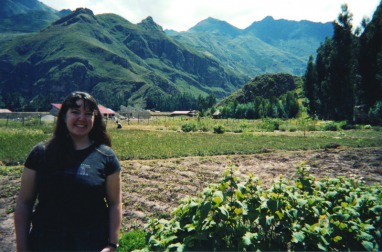
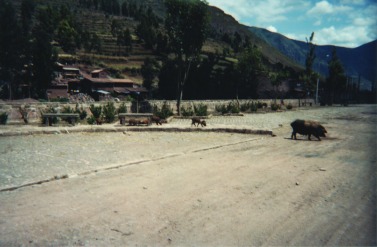
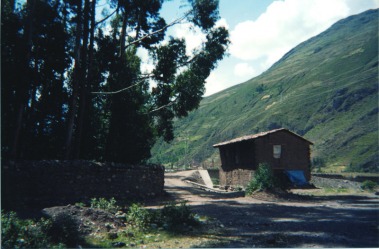
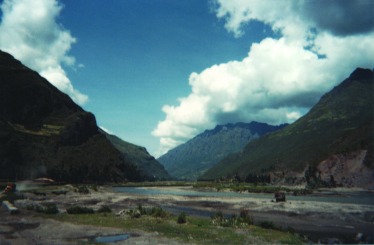
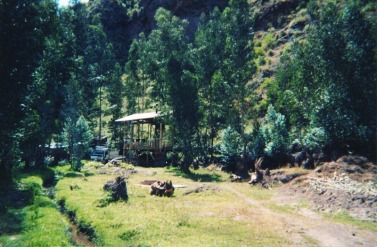
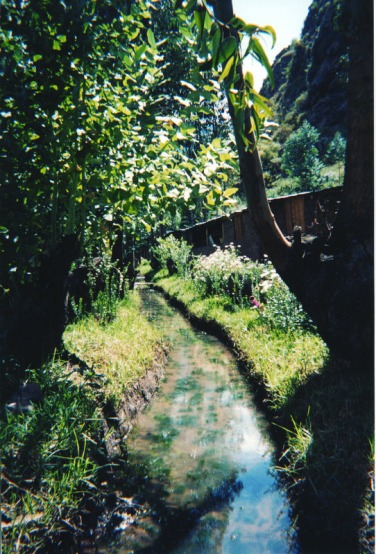
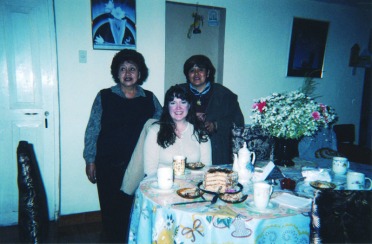
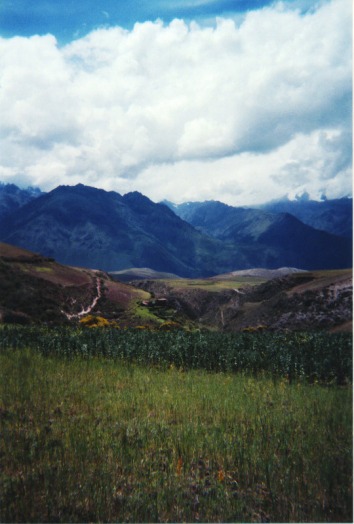
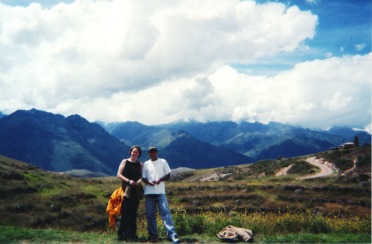
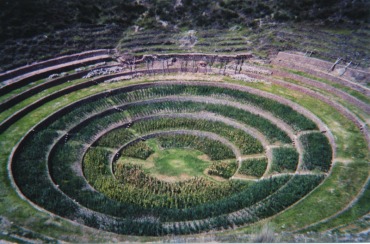
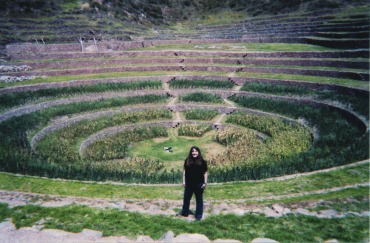
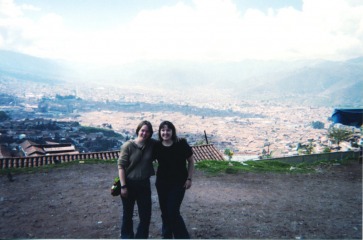
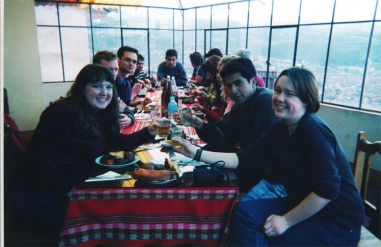
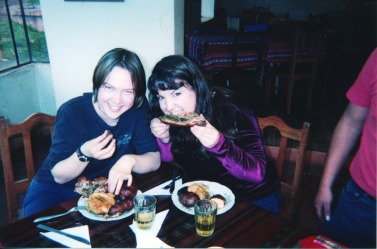
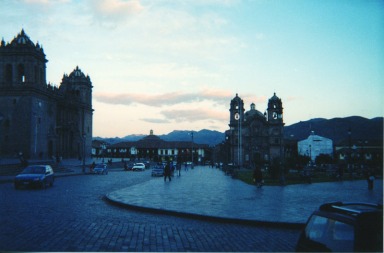
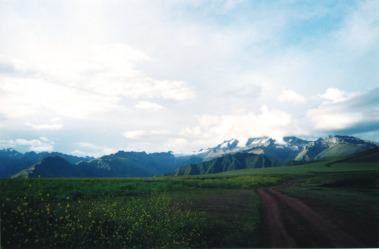
 RSS Feed
RSS Feed